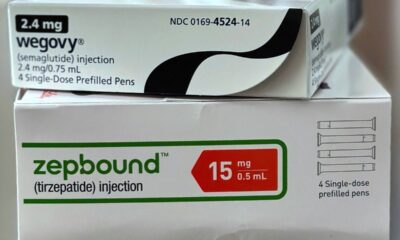Science
Study Reveals Ozempic’s Impact on Alcohol Consumption

Researchers have unveiled intriguing findings about the effects of GLP-1 medications, specifically semaglutide, the active ingredient in Novo Nordisk’s Ozempic and Wegovy. Originally developed to treat diabetes, these drugs have gained popularity for their effectiveness in promoting weight loss. Recent studies suggest they also influence alcohol consumption, with many users reporting a reduced desire to drink.
The relationship between GLP-1 drugs and cravings for substances such as alcohol, cigarettes, and opioids has garnered attention. While the precise mechanisms remain unclear, it is understood that GLP-1s affect the brain’s dopamine reward system. This connection hints at the potential for these medications to address various addiction disorders.
A new study from researchers at Virginia Tech, published in the journal Scientific Reports, sheds light on how GLP-1s may alter the body’s processing of alcohol. In the study, participants consumed three alcoholic drinks over an hour while their blood alcohol levels, glucose, and vital signs were monitored. The results showed that those on GLP-1 medications experienced a slower rise in blood alcohol levels compared to non-users, indicating a delayed and diminished feeling of intoxication.
The pharmacological effects of GLP-1s, known to slow gastric emptying, may contribute to this phenomenon. With alcohol entering the bloodstream at a slower pace, the overall impact of drinking appears less significant. This complexity underscores how GLP-1 medications can simultaneously modify neurological responses to alcohol while also influencing physiological processes in the body.
According to study co-author Alex DiFeliceantonio, a neuroscientist at Virginia Tech, understanding these effects is critical. He noted, “Faster-acting drugs have a higher abuse potential. They have a different impact on the brain. So if GLP-1s slow alcohol entering the bloodstream, they could reduce the effects of alcohol and help people drink less.”
Despite the promising findings, the study’s small sample size of just 20 participants highlights the need for further research to validate these results and explore their implications for addiction treatment. As scientists continue to investigate the multifaceted effects of GLP-1 medications, a clearer understanding of their potential to combat substance use disorders is gradually emerging.
This latest research adds to the growing body of evidence surrounding Ozempic, indicating that it could play a role in not only weight management but also in modifying behaviors associated with alcohol consumption. As the medical community seeks innovative solutions for addiction, the insights gained from studying these medications will be invaluable.
-

 Technology5 months ago
Technology5 months agoDiscover the Top 10 Calorie Counting Apps of 2025
-

 Health2 months ago
Health2 months agoBella Hadid Shares Health Update After Treatment for Lyme Disease
-

 Health3 months ago
Health3 months agoErin Bates Shares Recovery Update Following Sepsis Complications
-

 Technology4 months ago
Technology4 months agoDiscover How to Reverse Image Search Using ChatGPT Effortlessly
-

 Technology1 month ago
Technology1 month agoDiscover 2025’s Top GPUs for Exceptional 4K Gaming Performance
-

 Technology2 months ago
Technology2 months agoElectric Moto Influencer Surronster Arrested in Tijuana
-

 Technology5 months ago
Technology5 months agoMeta Initiates $60B AI Data Center Expansion, Starting in Ohio
-

 Technology5 months ago
Technology5 months agoRecovering a Suspended TikTok Account: A Step-by-Step Guide
-

 Health4 months ago
Health4 months agoTested: Rab Firewall Mountain Jacket Survives Harsh Conditions
-

 Lifestyle5 months ago
Lifestyle5 months agoBelton Family Reunites After Daughter Survives Hill Country Floods
-

 Technology4 months ago
Technology4 months agoHarmonic Launches AI Chatbot App to Transform Mathematical Reasoning
-

 Technology3 months ago
Technology3 months agoUncovering the Top Five Most Challenging Motorcycles to Ride





















